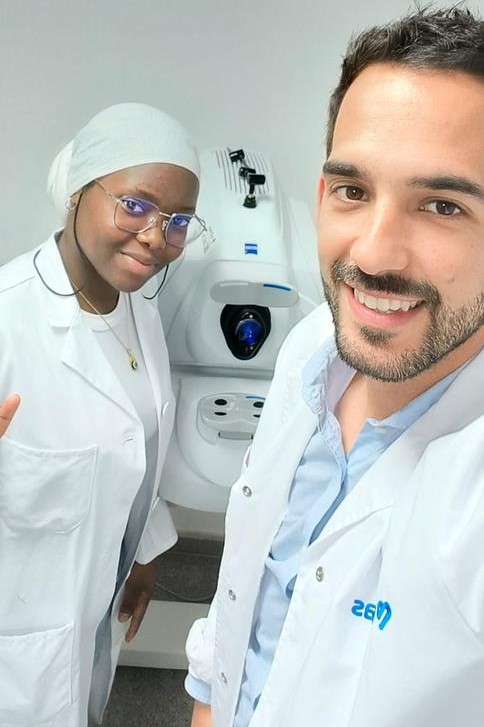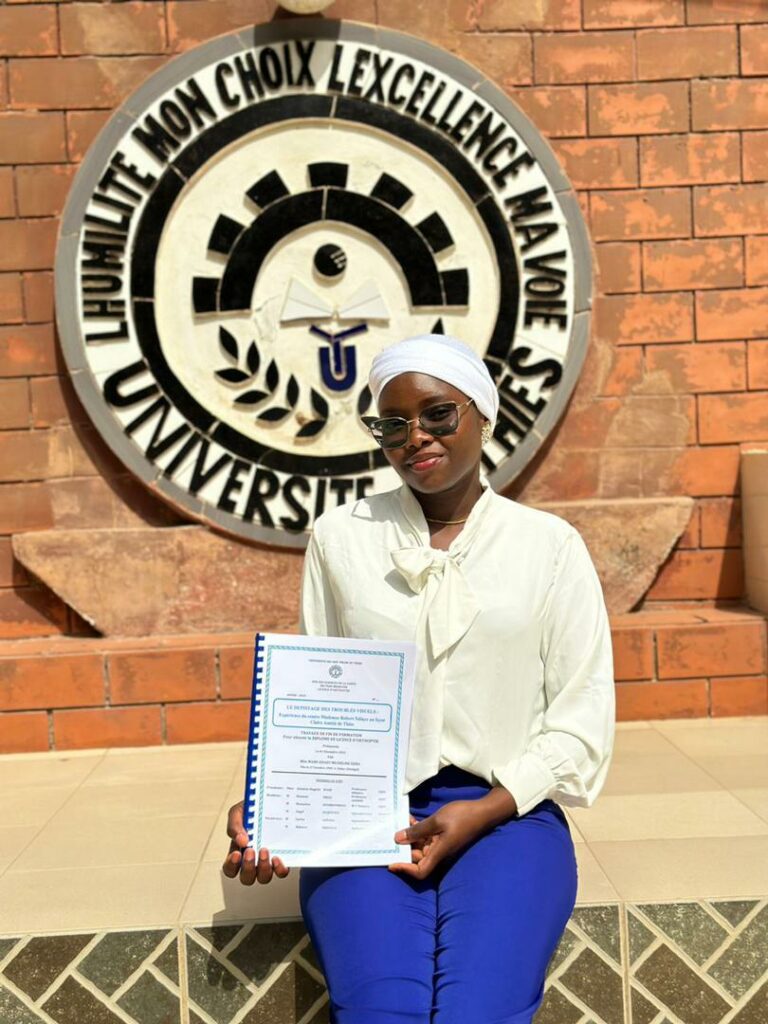Mame Khady Micheline DJIBA is 24 years old and has just completed her degree in Thiès. She shares with us her impressions after completing a one-week internship at the Vithas 9 de Octubre hospital in Valencia, guided by Carles Fresno, volunteer optometrist for OCULARIS and academic director of the Master’s in Pediatric Optometry at UPC.
O: Why did you choose this career in orthoptics?
M.K.M Djiba: Honestly, I had never heard of this discipline and did not know anyone in the visual health sector; in Senegal, we have very few professionals in this field. I had finished my baccalaureate and did not know what to do. My father had heard about this degree and encouraged me to enroll. And honestly, I am very happy I followed his advice: it is a job that I love and that deeply motivates me because of the improvement we bring to our patients’ lives. For example, thanks to our rehabilitation exercises, we can significantly improve strabismus, diplopia, or nystagmus… mainly in children but also in adults.
O: Give us an example
M.K.M Djiba: I particularly remember a lady we received in Diamniadio with a deviated eye (a one-eyed strabismus). We performed a Hess-Weiss test that precisely identified the muscle responsible for her deviation, so that Pr. Mamour Dieng, associate professor of ophthalmology and former hospital intern, could perform her surgery. I will never forget her happiness when she saw her eyes aligned for the first time. This case shows the complementarity between the orthoptist and the ophthalmologist in medical care. She was about thirty years old, and despite the improvement, she almost saw nothing from the eye that had been deviated: had she been treated as a child, things could have been different, and it is very likely that she could have avoided or reduced this vision loss. That is why it is essential to have more professionals who can attend to everyone in time.
O: How was the week of practice in Valencia useful to you?
M.K.M Djiba: : It allowed me to improve important aspects that, in my opinion, were not sufficiently deepened during the degree. This is the case of orthoptic evaluation which I really had to review, but also other techniques such as the use of biometric devices for calculating lens implants and OCT. These are techniques that we have been able to practice with Carles Fresno in Valencia and aspects that we are, of course, going to improve in the degree curriculum.
O: Now that you graduated, how do you imagine your professional future?
M.K.M Djiba: This week of practice gave me the opportunity to travel to Europe for the first time, and it was a wonderful experience. But I clearly want to work in Senegal and contribute to improving visual health in my country. For now, I have joined the Madoune Robert Ndiaye Vision Center of the University of Thiès and will participate in the practical supervision of orthoptic students in collaboration with OCULARIS. In the future, I want to become a teacher and why not open my own clinic. There are many opportunities for personal development for me while providing service to my country.
O: Are there many women in this profession?
M.K.M Djiba: The truth is that we are the majority in this training. But it should be noted that we are still few students in general. Since 2019, 5 people have graduated, and there are another 11 in training. Little by little, the number of students is increasing, which is promising.
O: What are the next ocular health challenges for your country?
M.K.M Djiba: Although the general situation is improving, we still lack equipment. At the university, there are almost no books on orthoptics. But the most important thing is still training to have qualified personnel and attend to our population. I would like to take this opportunity to thank OCULARIS, Professor Aïssatou Wane (coordinator of the degree), Professor Mamour Dieng, and all the teaching staff, the Vithas hospital in Valencia, the Iba Der Thiam University, and of course Carles Fresno for their help. I am sure that if we continue to work as we have done so far, we will soon see significant improvements.



